Practicing Dutch in the museum, a unique opportunity
In the fall of 2025, the Museum Plantin-Moretus in Antwerp (Belgium/Flanders) will highlight the role of women in the Plantin family business at the time. At the expo Vrouwenzaken/Zakenvrouwen (Women's Affairs/Businesswomen) you can find impressions of women at seven locations in the museum that tell their stories. The women all lived, worked, and played a significant role in the success of the Plantin-Moretus family business. The archives contain many letters, household journals, and diaries that provide insight into the lives of these women. But how do people today view this? The students of The Reading Club from Center for Adult Education Encora in Antwerp help with this. It turns out to be a unique opportunity for both the students and the museum.
Sven Peeters is a Dutch teacher for non-native adults (NT2) at Center for Adult Education Encora in Antwerp. Together with Željka Balentović, he guides NT2 students in, among other things, The Reading Club.
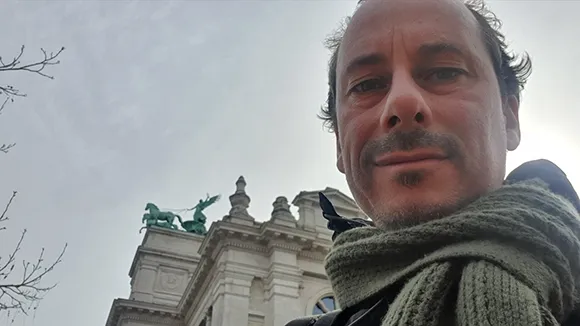
In NT2 lessons at a center for adult education, many people imagine students taking lessons in a classroom. But can it be different?
Sven Peeters: Of course! About 8 years ago, we started the 'Open Class' at our center for adult education, Encora, for advanced NT2 students (B2 and C1 level). In addition to the regular courses, these students can also choose an 'open module.' You can compare such an open module to an 'elective' that we can fill in very flexibly and based on the needs of the students. The students are very free in their choice of assignments and texts. This means that we, as guides of the open modules, become less real teachers and more coaches. Everyone comes to the lesson with their own needs, and we can cater to everyone individually. We noticed that many students are involved in many things in the city (Antwerp) or in society. We can respond to this in the open class. In recent years, my field of action has therefore shifted much more from 'teaching in the classroom' to 'going outside with the students.' We call these activities outside the school a 'Buitenkans' (a unique opportunity). The Reading Club in Museum Plantin-Moretus is an example of such a unique opportunity.
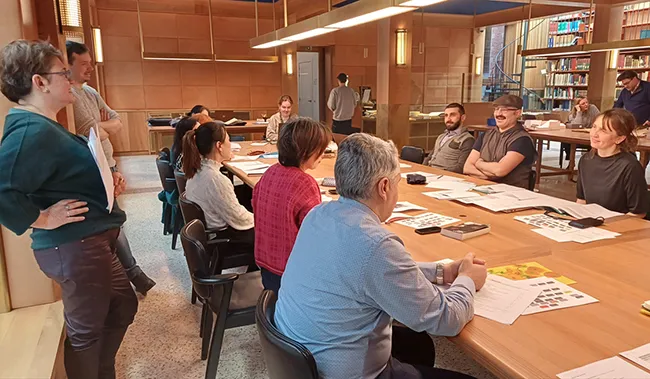
How did the collaboration with the museum come about?
Sven: Museum staff member Kris Geysen contacted us with a proposal for collaboration. "Wouldn't it be interesting," she suggested, "to have your students read historical documents from our extensive museum archive that is now being opened?" Kris told us that the public often hears mainly about what the men achieved at that time. The significant role of women in achieving these successes is often forgotten. And the museum wanted to change that. I immediately saw a 'unique opportunity' to set up a 'Reading Club' in the museum. For the concrete implementation, my colleague Željka Balentović was invaluable. She works in our open learning center and library. She knows our students very well and organizes many 'reading together'-projects. Željka also started 'The Reading Club' at the time. We actually have two reading clubs, one for beginners and one for more advanced students. We always choose an interesting book or theme. The Reading Club in Museum Plantin-Moretus fits perfectly into this concept. The Reading Club in the museum started in September 2024. A second group started in January 2025. Every three weeks, we meet on Tuesday afternoons in the museum's reading room. The students read a piece, reflect on it, and sometimes write something.
Museum Plantin-Moretus in Antwerp is located in the original house and workshop of the Plantin-Moretus publishing family. In 1576, Christoffel Plantijn moved his printing house to the house 'De Gulden Passer' on the Vrijdagmarkt. The museum tells the story of 300 years of family history and entrepreneurship. The last owner, Edward Moretus, sold the house to the City of Antwerp in 1876. The museum houses the oldest printing presses in the world, family portraits painted by house painter Peter Paul Rubens, and the original Garamond typeface still found on every computer today. The library contains more than 25,000 works printed before 1800. The collection of prints and drawings from the Print Cabinet offers an overview of old and modern Flemish masters. And of course, there is the museum's archive. It contains documents from the mid-16th century to 1865. It is a paper goldmine with documents about the printing house and Plantin's trade. But also personal letters from the family and other families from that time are well preserved. These documents tell us so much about the history and life of that time that it has been declared UNESCO World Heritage. From these documents and letters, you can learn that not only the men of the Plantin family ensured that the family business could last for 300 years. The role of the women in the family is not to be underestimated and is often forgotten. The museum wants to change that from September 13, 2025, with a special exhibition about the women who lived in the house: Vrouwenzaken/Zakenvrouwen (Women's Affairs/Businesswomen). At seven locations in the museum, you can meet women who tell their stories. They talk about work, children, marriage, health… Themes that are familiar to everybody.
Kris Geysen is a museum staff member. She contacted center for adult education Encora to do something with NT2 students for the exhibition about the women in the museum in the fall of 2025.
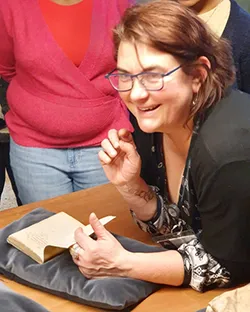
What did you have in mind for this cooperation?
Kris Geysen (museum staff member): We don't know enough about the stories, roles, and importance of women in the Plantin printing house and trade. We want to make their role visible by placing temporary 'installations' in the museum about who these women were. We have been conducting thorough research in our archive for some time. We found letters, household books, and other documents written by the women or which they received from others. Our first task was to 'translate' these documents so that everyone can understand them. The writing and language of that time were quite different from what we know now. Some of these authentic documents will also be exhibited. But we don't just want to do research from behind our desks. We also want to know how people today view that time, those documents, those women. What do the documents remind them of? What questions do they raise? What do they recognize, what do they know, and what do they assume? What do they find strange? Where is more explanation needed? The Reading Club reads along in the archives and helps make content choices. They read letters and documents with us and then discuss them. We have been doing this since September 2024 now. We notice that some questions keep coming up. For example, about the education these women received. What position did the women have in the house and trade? Was there equality between men and women? Yes, very often the conversation is about how men and women interacted in the past.
How does a session of The Reading Club go?
Kris: During a session of The Reading Club, we always follow the same pattern. Today, for example, we read archival pieces related to the life of Anna Maria De Neuf. First, we place her in the Plantin-Moretus family tree. Anna Maria De Neuf is from the fifth generation of women in the family. She lived from 1654 to 1714. In today's session, we focused mainly on how people treated domestic staff at that time. It includes wet nurses, kitchen maids, chambermaids, stable boys, coachmen, and so on. Our archive staff member Tom Eerkens had already done a lot of preparatory work for this. The students received a nice overview of the historical context of the domestic staff at the Plantin-Moretus house. They learned about their tasks, how much they were paid, what clothes they wore, and so on. We also read part of Anna Maria De Neuf's will. It was not an easy text, with a lot of notary jargon from that time. This required extra effort from the students. Last time, we gave the students the original old text, the explanation of some difficult words, and of course, the translation of the text into modern Dutch. They could already go through it. We read in her will how Anna Maria De Neuf also thought of her staff after her death. Her maid, the coachman, her son's servant, her servant… They could all count on a nice amount of money. At least if they were still in her service at her death. So, this was also a way to bind them to her because good staff was hard to find at that time. Some of her staff also received appropriate clothing to mourn her death. In those days, that was not cheap, Tom told us.
After the coffee and cookie break, a very special moment follows. On a large table are original letters and documents from the archive. The students look at them with wide eyes. They are even allowed to browse through them. They are aware of the great privilege they have here. They can, so to speak, really touch history. Tom gets tons of questions. And he answers them to the best of his ability.
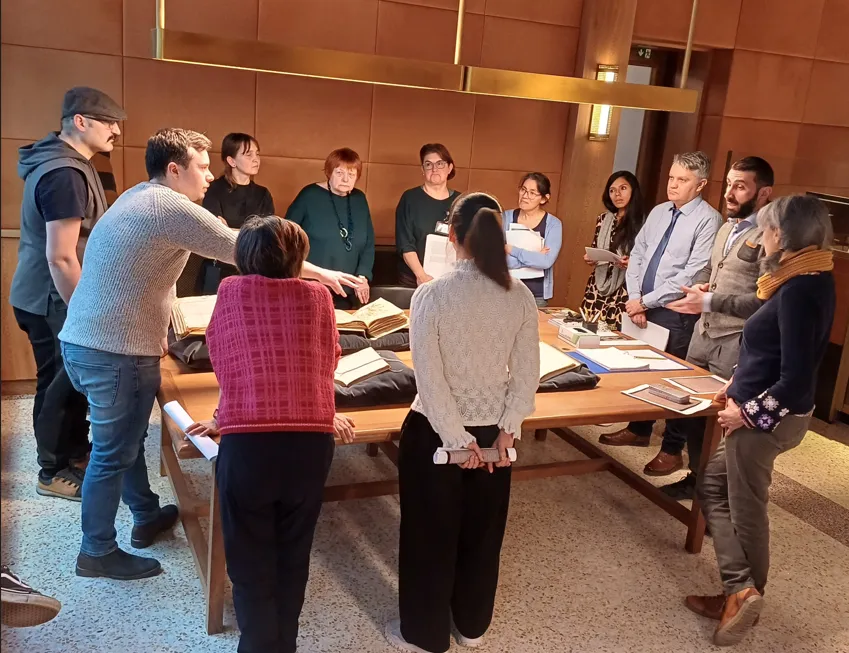
Why do you choose to do this reading group with people who do not have Dutch as their first language?
Kris: We want to bring different perspectives to our story at the exhibition. We could also read with other groups, but it is very intensive to do this with many groups. In this reading group, we reach a broader range of experiences and stories. We inspire each other. The participants in The Reading Club, all NT2 students, read together and then tell each other about their own life stories and how some things are the same or different. They also reflect on their own experiences here in Antwerp. I find this historical perspective a great added value for this Reading Club because it gives participants more points of comparison. They see, for example, how things were in Antwerp 300 years ago, in the printing house and trade. They compare that with how things were in their own country in the past, how they are now, and how things are for them today in Antwerp. This definitely broadens their perspective. They also notice things that a Flemish or Belgian person might not see. At one point, someone remarked that all those letters and documents were so neat and well-kept. She wondered if this was really typically Flemish. That was also a question for us to ponder. "Is that typically Flemish, or not?"
How will you incorporate the students' input? How will it be reflected in the installations at the exhibition?
Kris: We are not going to put it in a separate booklet or anything like that. We have already discussed with the museum staff how the installations will look. We know the main ideas we want to convey. The REantwerp studio of fashion designer Tim Van Steenbergen is creating contemporary silhouettes that represent the women. Writer Aya Sabi is writing audio stories about the different women's lives based on preserved sources. The input from the Reading Club will help us make content choices because we also want to present a testimony from someone today. So today, I listened very carefully to what the participants said. That gives inspiration and makes it clear where we need to place the emphasis. For example, the notary wrote in Anna Maria De Neuf's will: "because nothing on this earth is more certain than death and nothing more uncertain than the hour of death." That sentence struck many students. They found it so poetic. It made them reflect and philosophize further. Until we brought in Tom, who labeled this sentence as 'notary jargon from that time.' The same sentence often appeared in wills from that time. Then the discussion turned to the use of incomprehensible jargon. Apparently, this is not just a problem of our time. The curator of the exhibition, our colleague Zanna Van Loon, is also doing this exercise for herself. Then we will discuss how we can bring all this together. The inspiration for what we will highlight extra will largely come from the Reading Club. Because we know: 'We heard that in the Reading Club. People find that important…'.
The Reading Club starts twice a year, in September and January. Kris is not alone as a guide. She can rely on the expert and experienced guidance of Sven Peeters and Željka Balentović, both employees of CVO Encora. Željka started the Reading Club a long time ago and knows the ropes like no other. Indispensable is Tom Eerkens, project staff member of the museum's archive. He does all the research, outlines the historical context, makes the transcriptions and word lists, and ensures that the original pieces are neatly laid out on the table in the reading room before the session begins. He listens in the background to the questions the students fire at him. He always has a satisfying answer. And if he doesn't know something, he readily admits it. The past (fortunately) still keeps some secrets to itself. Sylke, a Dutch student from Friesland who is doing an internship at the museum, also participates in the conversation this time. Her input from the far north of the Netherlands is greatly appreciated by the students. And then there are volunteers Fré and Eliane. Fré neatly notes everything the students come up with. He also ensures that participants can enjoy coffee, tea, and the indispensable cookies during the break. Eliane notes everything for the Reading Club blog. Fré's report will be a rich source that will serve as material for the exhibition in September. And who knows, maybe it will be thoroughly examined and studied by the participants of a Reading Club 300 years from now.

Željka Balentović started the Reading Club a long time ago. She knows the students very well and guides them during the reading sessions.
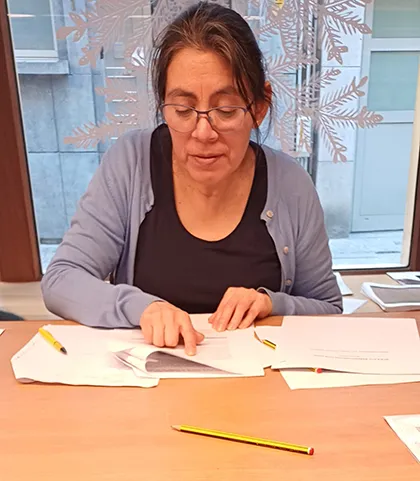
Student Sandra reading a piece of the will of Anna Maria de Neuf out loud.
OTHER UNIQUE OPPORTUNITIES
Center for Adult Education Encora is a very large center in Antwerp with more than 200 Dutch-as-a-second language colleagues, for more than 8,000 students annually. Sven and Željka, together with other colleagues, are always looking for 'unique opportunities' to learn Dutch. This can be a visit to a museum, a guided walk in the city, a lecture, an author visit, or a game night in the school library and open learning center, or another outdoor activity. These are all opportunities to really get the students outside and let them learn Dutch very practically.
Sven: I strongly believe in our school and its importance. My colleagues and I want to offer our students the best and most motivating opportunities to practice, speak, and write Dutch. Getting all these things done requires a lot of improvisation and organization. But I enjoy doing it because I live for my job. That's why I always try to keep my antennas up to find exciting practice opportunities for our students. For example, we can already visit the city museums for free with our NT2 groups. The language promoters of the Antwerp adult education centers also work with several guides who lead our groups through the 'monumental churches' of Antwerp. This is really a hit because there is so much to learn: about the city's history, all kinds of religions, about culture here and elsewhere. There are also many language practice opportunities, to speak or read. Just think of the sign with what is allowed and not allowed in the church. You can then, for example, ask the students what is allowed and not allowed at their home.
LANGUAGE INTERNSHIPS
We also have Language Internships. For these, we first look at the talents of our students. Based on that, we look for a place where they can do a language internship. If someone, for example, is very good at flower arranging, we look for an internship opportunity in a flower shop. But for other students, it can just as well be in a cultural center or a bakery.
LANGUAGE OUTINGS
Every Friday afternoon, I take students into the city for a 'Language Outing.' We take a walk, visit a museum or an exhibition. I try to leave the beaten paths a bit. I really try to go to places where our students would not otherwise come. For example, we went to the VolxMuseum in Deurne. There you can see how people lived in Antwerp in the 19th century. We also went to the Tropical Institute, as a stop on a colonial walk. Last year, a real book even came out of Language Outings, 'Old City, New Eyes.' In collaboration with Erfgoed Lab Antwerp. With the stories of ten students and two teachers with a migration background, we made this book. They write about how they look at the city, its history, customs, people… from their own perspective and frame of reference. The texts are not only in Dutch but also in the authors' mother tongues: Spanish, Russian, Chinese, Turkish… Working together on this 'City Chronicle' was the best language practice you can imagine. Our students/authors really outdid themselves. And they were so proud of the end result! The City of Antwerp was also very enthusiastic because it was the first city chronicle written by newcomers. A journalist even came to interview us about it.
THEATER CLASS
In the Theater Class, our colleague Sabine takes the students to theater performances, which they also discuss afterward.
HEARTFELT WORKSHOP
We still have some collaborations in the pipeline. For example, with the academy of Merksem. They have a large space in Park Spoor Noord. They want to organize a 'heartfelt workshop' there. At the moment, that space is mainly used for after-school childcare. Many of our students live in that neighborhood, and our center also has a campus there. In a pilot project, we want to go to this heartfelt workshop with a group of interested students to show them that they can be creatively active in their neighborhood. And of course, this offers many opportunities to practice Dutch because they will meet many native speakers there. We always keep this goal in mind. Another reason why we seek collaboration with the academies is that our students brought many talents from their home country, but they often cannot use them here, or they don't know where. They usually don't know about the existence of academies. This is another example of how we try to get people and their talents in the right place.
CITY HOSTS
Recently, I came into contact with the City Hosts project. They are looking for people who like to approach others and guide them in the city. I immediately thought this was something for our students. That's why I'm putting together a group for this. Again, my colleague Željka helps me find suitable students for this.
ERASMUS+ EXCHANGE
What I am also very proud of is our Erasmus+ exchange project. It was a real international adventure where we did an exchange with our NT2 students at the Scuola per Interpreti of the University of Trieste, with students studying Dutch there. One of our students even designed a special kind of stamp for that trip. We also published a photo book about that trip. There are now many Erasmus+ projects at Encora NT2, such as group trips with the students, job shadowing, and guest lectures with our foreign colleagues. Conversely, many international colleagues also find their way to Encora, for example, out of a special interest in our Open Classes.
AP UNIVERSITY COLLEGE
Another important project is running in collaboration with the teacher training program at AP University College. In that program are the teachers who will soon be teaching in very diverse classes in Antwerp. Communication and understanding each other is not always easy, especially not as a recent graduate. That's why we brought a group of students in contact with a group of our NT2 students to get to know each other better. They have already done many activities together. This way, mutual trust and understanding grew, and everyone gradually became more comfortable with each other.
THE WRITING WAYS
Another collaboration is with Creative Writing for 'The Writing Ways', the successor to the Great National Dictation. For this, we are now making several videos in which our students show in an original, funny, and interesting way how they are working with Dutch. We want to let some of these students speak in our library and later also in the large Permeke city library.
Sven: One of my dreams is to start a professional alumni network. I think, for example, of a Japanese ex-student, Noriko. She is now working on an exhibition about martial arts at the MAS and has made many contacts. A while ago, a Chinese student, Hong, guided us through the Red Star Line Museum. Another ex-student, Tawfeek, has now started his own gym. As far as I'm concerned, we can bring such experienced experts into contact with our current students, for inspiration and to exchange ideas about ambitions and experiences, talents, and job opportunities.




